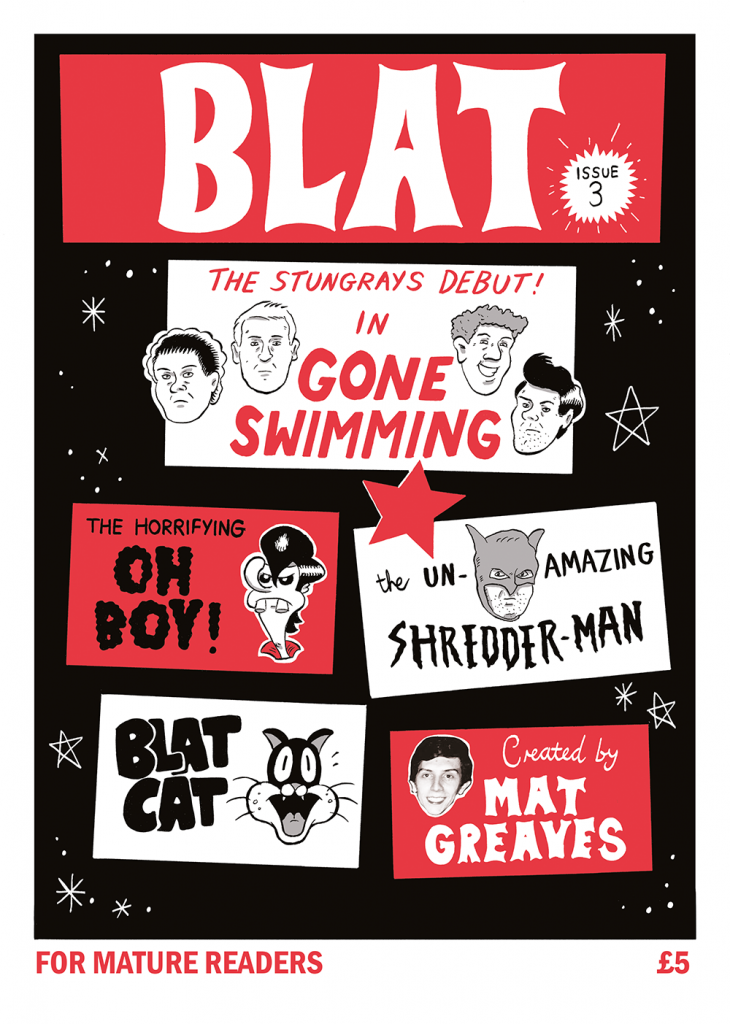
Mat Greaves is a 33-year-old cartoonist and animator living in Manchester, England. Mat is the author of the one-man anthology Blat, which saw its third issue released in July 2024, along with a host of other comics. A graduate of the University of Central Lancashire, Mat is also a founder of the Underground Kingdom Comix collective, which has released three anthologies to date (with a fourth on the way). I spoke with Mat via Zoom on the eve of Blat No. 3’s release—I hope he’ll forgive my delay in publishing our discussion on the struggle to maintain a productive artistic practice and his efforts to support his peers in the U.K. scene. – Jake G.
Jake Grubman: Much of your comics work seems to be about art and specifically making art. “Gone Swimming” is an ongoing strip about a group of normal guys getting this band together. And you have “Oh Boy”—it’s often about posturing in the making of art. Your strip Mulligan, which I loved, is about a cartoonist whose work turns pretty grim. Would it be fair to say you’re thinking often about that—how the making of art fits into your life?
Mat Greaves: Yeah, definitely. Issue two of Blat is literally that—it’s the theme, it’s different practitioners and people’s relationships to art as creators and consumers of, so that issue is explicitly so. But yeah I think all of it is. Like you’re saying, “Gone Swimming” is about guys who want to make music and stuff and the people in the new issue—the third issue is music-based. It’s a lot of people in bands, trying to make bands, play stuff. So it’s definitely a big part of what I do. And other strips I’ve done, like anthology strips, would fit into that category, as well.
So you work in animation as your day job and so of course there’s a substantial artistic component to that, but it seems like you’re also getting at the struggle for personal expression.
A hundred percent—that’s it, finding the time to do it. The way I do it is in chunks—I’ll work in animation for a bit, save up, and then eat into my savings as I make my comics and my art. And I’m now getting to the stage at the end of that cycle where I’m running out of savings and I should probably get a job again. So I’m back into the wheel of animation, I’ve done that off and on for the last few years.
I love animation, but in that kind of studio, kids TV, there’s very little room for creativity or self-expression. There are strict deadlines to hit, there’s probably too much work, there’s probably not enough time to do it. It’s very much, sort of, crack on. And also it’s kids TV, so there are rules of compliance, things the characters can and can’t do. So elements—like design, if you’re a designer, that’s probably a fairly creative job. But animating, it does fairly feel like an office job.
I tried to capture that in Blat No. 1—the opening strip is me watching Looney Tunes as a kid and then years later I’m sat getting some really bullshit notes from some person. I’ve tried to make it not look like anyone so I don’t get in trouble.
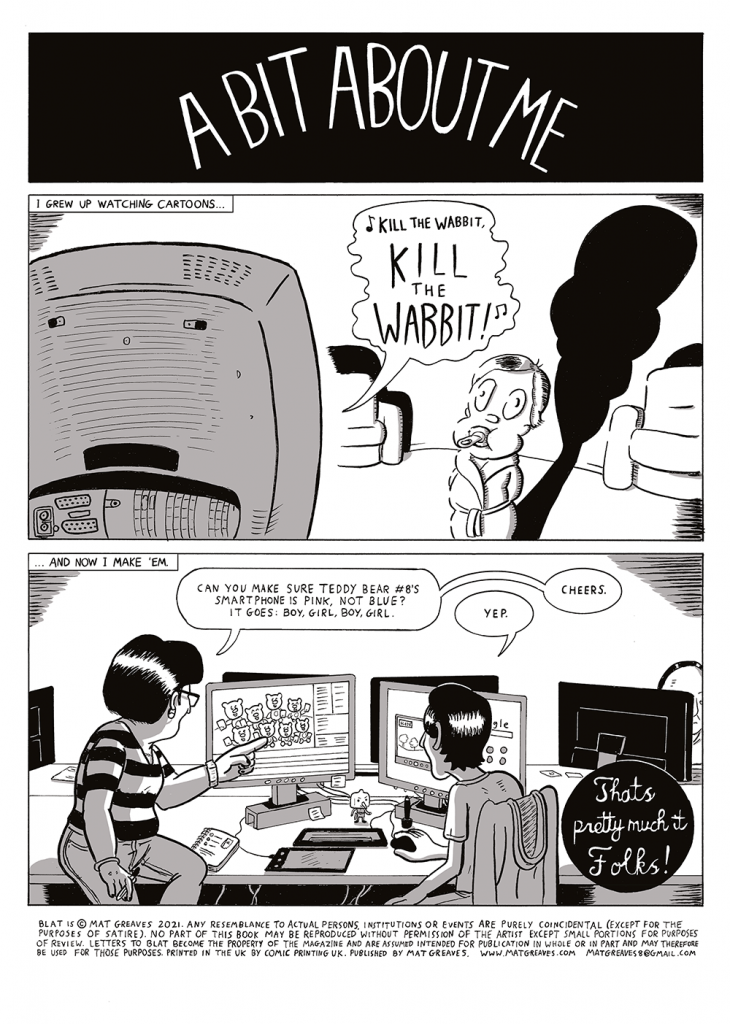
Yeah, the tone of that strip is a great intro into the series, because you can see the influence of classic animation in your strips, although you do work in multiple styles. So I really enjoy that one, although I don’t know if it captures the stressful pace of the job—you two are sitting at the desk and this person making this really specific and banal adjustment to what you’re working on.
Yeah, that strip captures the banality of it but doesn’t really capture the stress of it. But that job, like all jobs, is just those things taking turns. I suppose any kind of long-term, full-time employment is going to be that, so animation is no different. But it’s just funny to think of cartoon happy rabbits talking to each other and then imagine a stressed-out guy behind a computer with his head in his hands.
It’s something I want to explore more in the future. At some point—further down the line—I want to do an animated issue of Blat. So instead of being a book, it’d be a 10-minute cartoon or something. But that’s way down the line, but I’d like to do that, and that would explore even more specifically that animation work day-to-day kind of stuff.
It’s something I’m thinking about—the tension of art and beauty, art and creativity, versus work and the crushing wheels of capitalism.
As just a brief aside, do you ever have concerns about the content of your comics in relation to your work on kids’ TV shows?
No, because the closest I’ve come to it so far is that Blat strip, and I left it pretty vague and generic. There was a bit of work in an anthology recently—I did a short story in an anthology that was taken literally from an experience at work, so I changed the names and things, but the incident was pretty much the same, so if someone who was in that room would read it, they’d probably be able to piece it together.
But no, generally, I’ve kept those worlds very separate, so people at work might know I do comics but they wouldn’t read my stuff. So I’m not too concerned, and I’m not saying anything too slanderous either.
That’s fair. So you studied animation at university. At that point, were you also reading comics?
I started to read comics in university. When I was younger, I think I read some Batman stuff as a child, and I watched the cartoons and played the games—I probably knew that more from the cartoons and the games than from the comics when I was younger. But at uni, I started to read comics proper that I like—alternative, underground stuff. I started reading Viz—our version of Mad. But it’s much lower scale and it’s a bit more edgy. I started reading that at uni and loved it.
And you’ve contributed to Viz, right?
Yes, I did—I’m very proud to say I got in once years ago, a strip and a gag cartoon. I got a lot of bragging out of that for a few years, but I’ve kind of stopped bragging about that because it was so long ago. I think the statute of limitations has gone now. I’d love to get in again, but it’s hard to get in. It’s got a very specific, unique style of humor that’s hard to nail.
So I read that in uni, and I also found—the big one was an Ivan Brunetti-edited anthology, Graphic Fiction, and it’s got all the American cartoonists, all the big ones. I found that at the shop and was just like, “Woah.” It’s like a big catalogue, I was like, “I need to go buy that: Tony Millionaire, yep, Sammy Harkham, yep, Dan Clowes, yep.” I just used that as a sort of hit list to go through and ever since then I’ve been massively into that kind of stuff.
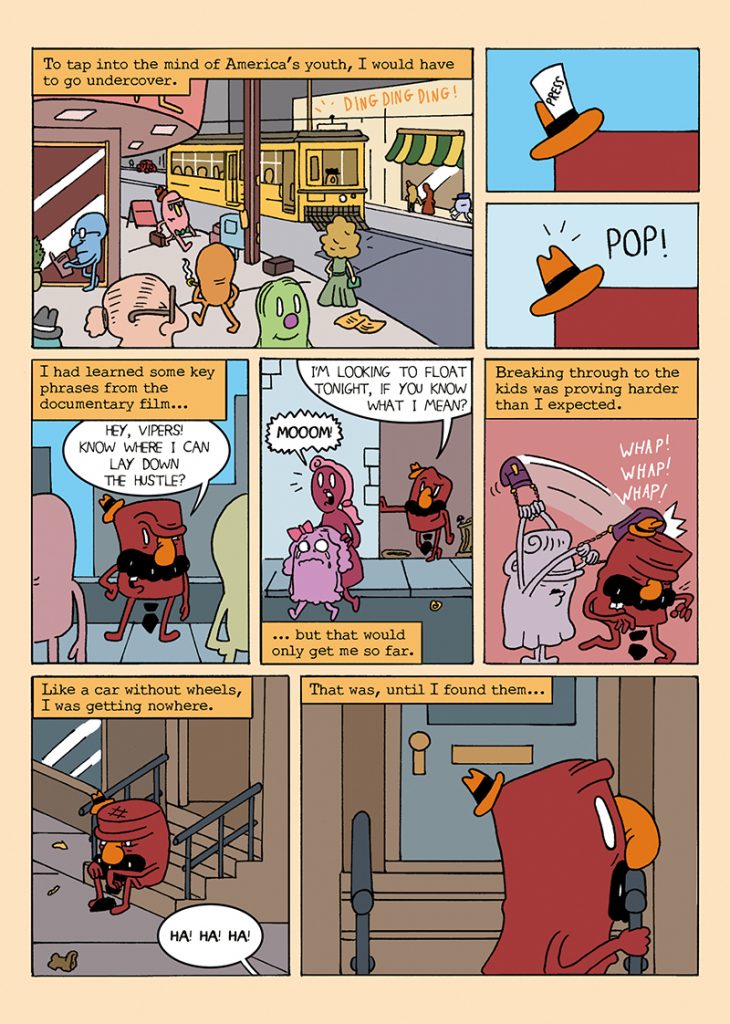
And what was the timeline of your comics-making since then? You started around 2017? And the first issue of Blat came out in 2021. And you’re also a founder of the Underground Kingdom Comix collective.
Yeah, the UKC stuff started in 2023. But my first comics—I’ve still got them online a bit, but I did three issues of a series called Chip McFitz. It’s sort of a wacky noir comedy about a detective who’s a reporter. He’s this manic news reporter who’s addicted to caffeine, and he runs around at a crazy clip. It’s kind of a spoof of old noir. It’s kind of weird stylistically, because at the time I was looking at a lot of UPA, ‘50s-style geometric animation. But at the same time, I was watching a lot of Ren and Stimpy. So I ended up with these weird, fleshy cubes and balls of people. And when people see that stuff, they’re like, “Oh, that’s quirky,” which is obviously code for “that looks really weird, I don’t know what that is.” But I’m still happy with them. I learned a lot about how to make comics while making them. There are bits of them I still think are good and funny and bits of them I wouldn’t like to look at again. But that’s just making stuff in general.
So, yeah, I did a few issues of that. At this point, I was reading Eightball and stuff like that, and I thought I’d like to do a one-man anthology, which is why I progressed up to Blat then. The first few comics were a useful lesson, but Blat is probably where I started to get good enough where I was happy with what I was doing, and I feel like that’s been the trajectory since then.
In the middle, Blat No. 2 was 2022, and UKC started in 2023?
Yeah, I basically had a year off from Blat, because I was doing an animation job. I was working full-time for a year. I’ve done it both ways: I’ve done it where I’m making comics at the same time as animating. But you’re just kind of spent when you spend all day looking at your computer and doing something vaguely creative, and then you come home and do the same and you lose momentum.
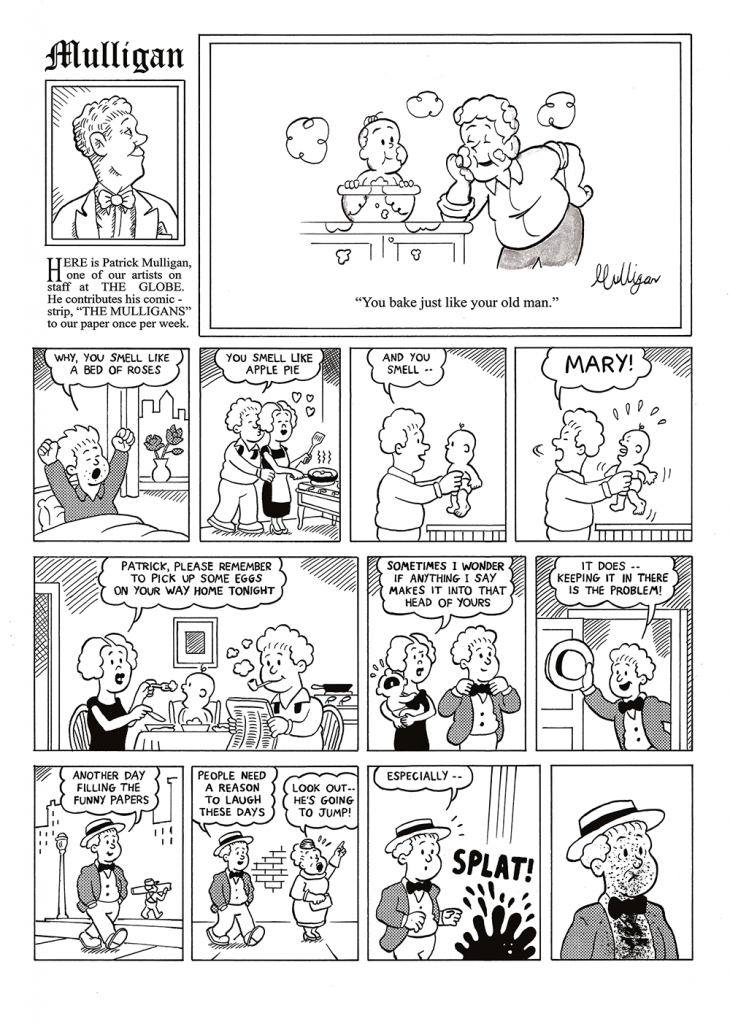
Yeah, I wanted to ask about that—it sounds like you sometimes work and make comics at the same time?
I’ve tried doing both, but what I’ve found most effective is to do them separately. So I’ll work a job, finish a job, and then take a few months off to work on comics. Doing them at the same time doesn’t work that well for me—like, in 2023, my output was quite small. The UKC books, I only did a few pages, and I edited them. And I did a couple of anthology pages. But I’ve not work in animation this year so far, and I’ve finished this Blat issue, a few anthology things—my output is way up.
And do you work digitally—I imagine that’s how you’re doing the animation work?
Yeah, I do a mixture of both. I ink traditionally—ink on Bristol board with nibs and things. But I’ll pencil digitally, in Photoshop. Because I find it much quicker and easier to adjust and move things around rather than drawing everything in pencil and having to rub it out and move it a bit. I just find that gets very tedious. So I’d rather that digitally because it’s quicker, I find—although, in a way it’s not quicker, because you have more time to finesse and nitpick. Sometimes with a pencil, you’re probably more forced to be like, “This is it. This is the thing.”
So there are pros and cons to it, but that’s just how I’ve found it. And then I print out those pencils and ink over them—I’ve got an animation table with a lightbox—and I’ll ink over those pencils. Then I’ll scan it back in and tidy it up and color it in Photoshop. So it kind of pings back and forth, but when I can, I usually ink traditionally. I like getting all the nibs and the brushes out—that’s the fun stuff.
A lot of people in comics—and, generally, who are trying to integrate an artistic practice into their lives—they’re thinking about how to do that while having their day job. But you’ve tried to totally bifurcate them: Sometimes, you’re focused on moneymaking work, in animation, and then those projects end and you shift over to comics work. Do you find that that gives you the energy to focus on what you’re doing at a given time, as opposed to trying both at the same time?
Yeah, I mean, people do juggle both at the same time, and I don’t know how they do that—I’m very impressed by that. In recent years, it’s been a one-for-me-one-for-them sort of thing. The stint—which, I accept, is the moneymaking time—and I’ll still try to contribute to anthologies or try and chip away at stuff when I find some free time. If it was up to me, I’d be doing this stuff all the time, but obviously this stuff doesn’t make money, so it’s just a fact of life where you have to go do that. People who do it full time—a lot of people either struggle or they have some financial help from family or a partner or whatever.
I’m quite lucky in the way I’ve done it, where I’ve been able to get an artistic job—one of the few ones that can pay okay—and I don’t particularly like animating but it’s a job that I’m qualified to do and I can reasonably do it. But all the time, I’m thinking, I want to do this stuff. I’ll be in an animation job and be like, “Not long now, I can’t wait to get at it.” And I’ll just come out running when I get the chance and have a really good—it gets longer each time. After I finish a project, you kind of start to lose momentum. You get a bit worn out, and you think, “Well, I’m not really making much stuff right now, I should probably make some money.” But as soon as you get the job, you’re like, “Oh yeah, I remember what this is like now. I love that, I should be doing that.”
This last time, my last animation job was November. So apart from COVID, that was a longer stretch. But this is probably the longest stretch I’ve had doing my stuff that I’ve had in a while, and it’s been great—it’s probably been the most prolific I’ve been. As you can see, I’m in an art studio—I’m renting an art studio in Manchester, in the city. I was working at home prior to that, but I’ve got a dedicated art space now, where I can do comics, and I’ve started doing oil painting in the last year or so and I love that.
So I feel very—well, I did feel very creatively energized. I feel a bit less so now that I’ve just finished this book; I’m kind of in a post-project slump, I suppose. But yeah, I’ve loved it, the last six months. And now I have to start getting some work again, because I need to pay for all this stuff. That’s the tension of it. And that’s what I’m always exploring in my work—the tension of wanting to make stuff and making stuff versus the world around you, which doesn’t allow you to do that sometimes. That’s a tension I’m always thinking about, definitely.
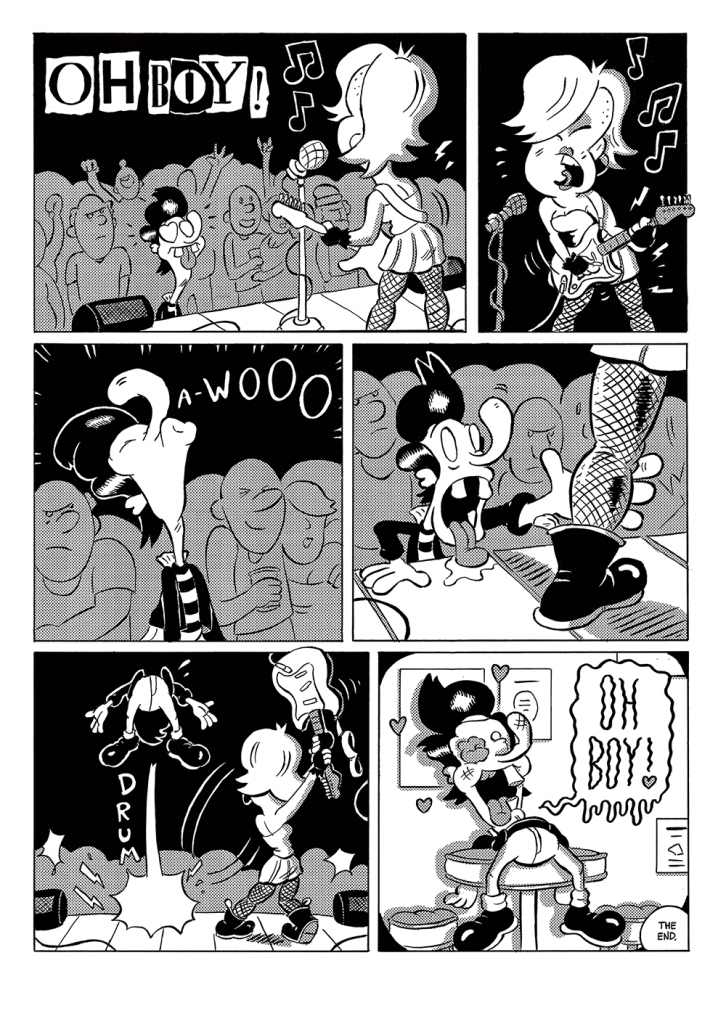
Yeah, I imagine you’ve been thinking about this for a number of years. And for myself, I don’t know if I ever make progress on that question. Do you think your thinking on that has evolved? Do you think you’re more comfortable in your mind with respect to the relationship between commerce and artistic production?
I feel like you come to terms with it because you’re an adult in the world with responsibilities. I feel like very few people must make money doing this sort of stuff. Especially in the U.K., there isn’t as much of a market for it as in America, but even in America, with a few exceptions, no one’s making tons of money out of it.
The exceptions must be single digits.
Yeah, exactly. But it’s just something you have to deal with. I was talking to someone about this the other day and you kind of feel like a spoiled baby when you’re like, “I don’t want to do the boring stuff, I just want to do the fun stuff.” And it’s like, everyone would like to do the fun stuff—that’s not an interesting take. Work is just—you have to do that. But it is something that I think about and struggle with sometimes. But I feel like it used to depress me. And now it kind of angers me a bit more, which is the opposite of what I thought: I thought I would mellow out over time, but I think it actually annoys me more—the fact that there’s stuff I could be doing, that I enjoy doing, but it’s just finding the time to do it and the means to do it.
But not to be negative all the time about how I just wish I was doing this all the time—I feel like I’m getting into a good groove with stuff at the moment and people are picking up these books, the UKC stuff is going well, and these things take time. People say it takes like ten years to get anywhere in any kind of industry, and I feel like I’m starting to progress in some way.
That’s another thing in regards to the work: I feel like I’m getting some momentum. I’ve gotten into a good rhythm of work, making the work, and shipping out the work, and contacts and things—I feel like I’m making good momentum in that regard. But if I did another year of an animation job, I would kind of lose that momentum. You kind of feel like I need to keep being present, because if I stop making stuff and being social online, people will forget about you and all that stuff.
This time around, I’m going to try to get shorter-term animation jobs, like commercial work, which hopefully will be a better balance, where instead of having a six-month job, I’ll have maybe a one-month job, just an injection of cash where I won’t have to commit to this massive, long schedule, and still have time to make art and comics that I want to make. But we’ll see.
Can I ask a logistical question? In the States, I think a lot of people worry about keeping health insurance, because a lot of it is attached to your employer. But is there any of that consideration there?
No, not as much. The NHS—everyone agrees it’s in a bad place. It’s on its knees, it’s so underfunded, understaffed. It is visibly worse than when I was younger. It is in decline. But that being said, if you are sick, you can get seen—maybe not as quick as you’d like. And it’s still free, mostly. Some people will pay private now just to get past the queue. Some people are resorting to private because they have to in terms of, “I can’t wait this long.” But generally, in my experience, it’s not as much of a concern. That’s one less worry we have than you have, potentially.
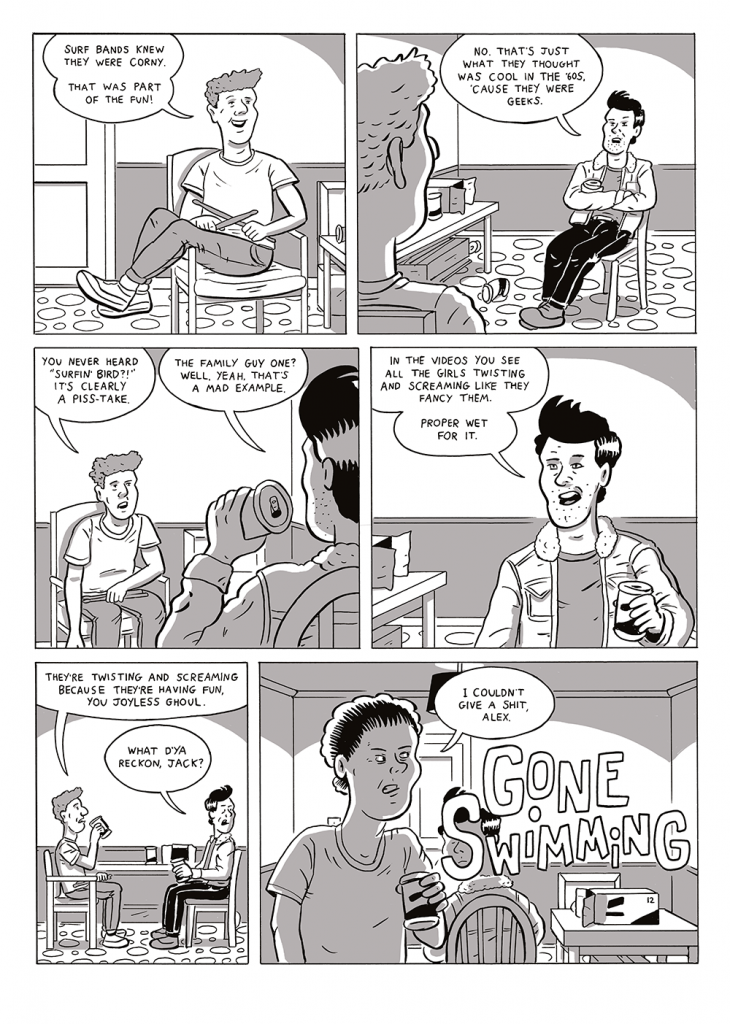
I see—this seems like something I should know. But I wanted to ask about a strip in Blat No. 3, the ongoing strip “Gone Swimming.” It feels like it’s more fully realized with every strip that comes out—it’s appeared in each issue of Blat. And I wanted to ask how you’re feeling about the direction of that ongoing series.
I’m pleased with it. I was just looking at it because I’ve got the new one, and I was comparing it to the old ones. And I was looking at the art style and stuff—any long-running series is going to evolve as it goes on, the style of it—and I’m quite pleased with how the chapter in issue three has turned out. I looked back at two and I thought some of those drawings look so janky compared to what I thought I did in my head. But I feel like I got the characters much more in the third issue than in the second issue.
I kind of know where it’s going—I’ve not written a script, but I’ve got bullet points I want to hit with the story—but when I get to the issue, I write the chapter there, so I wrote chapter three when I started Blat 3. But I generally know where it’s going. But I’m curious how people who receive it. Because it’s about friends making music, but it seems like a very understated, low-stakes kind of thing. It’s just some guys making a band. Especially the new issue, they go to a gig at a pub. I like stuff like that, but I wonder if comics readers who read more traditional superhero stuff and things like that will be like, “Why is this guy writing a book about some guys in a pub?” It feels very understated and British and stuff—I also wonder how that translates to American readers. Because it’s based around where I’m from, Manchester, so it’s got vernacular and stuff.
But I’m pleased with it. I’ve had a few people say they like it, and it’s a bit of a departure for me because it’s kind of the most earnest stuff I’ve done, where my stuff is usually quite silly or satirical. That one feels a lot more grounded.
Yeah, to me, the tone lends it a literary quality. I don’t know if I’d describe “Oh Boy” as literary, although it’s a really fun strip. “Gone Swimming” just seems to have a different quality. I was surprised when I first read it, because it heads in a different direction from a lot of the other strips—especially in issue one. But now that we’re on three, I feel like expectations are set, and I appreciate coming back to it. And like we’ve talked about, it explores a lot of the same ideas that your other work is getting at, just from a different angle.
I’m also looking forward to going ahead with “Gone Swimming,” because I feel like the first three chapters—although, if people went, “Do I need to read one and two to know what’s going on?” I don’t think you do, but I feel like I’ve set the table quite nice in that way. You’ve met the characters, you know what their thing is. And now I’m hoping to explore in the next issue the characters, them in the world. Like I said, it’s about guys starting a band—they’ve started a band now. So I can just explore the characters more.
So do you feel like you’re exploring the same kinds of questions in your shorter work, your anthology stuff, or the strip you’ve done for UKC?
My UKC strip, the crime strip—yeah, I guess there’s an element of it there actually, yeah. It’s always about people trying to navigate working life. The crime one is a bank robbery, so I guess even that’s people trying to avoid doing work. It’s just all of my strips are people trying not to have a job.
On UKC, how did you all come together? And cartooning can just seem like a solitary activity, and so I was curious how you feel the community aspect facilitates your making of art.
Yeah, it came together, because prior to that I was on the Gutterboys Discord or the Bubbles forum—Michael Sweater had a forum at one point. Just looking for that community of comics chat. I don’t personally know many people to talk comics with—especially the kind of comics I like, which are kind of more underground ones. So I would sort of hang out on these forums and discords and things, and then they all kind of collapsed for whatever reason—inactivity or whatever.
And I was just thinking, this sort of thing is good, and it would be good to have a U.K. version of this, because there are a lot of people making similar sorts of stuff in the U.K.—one-person anthologies with a mature sense of humor and art styles inspired by the same things I liked—Eightball and things like that. There was a network of people who weren’t connected yet; they were just people in separate parts of the country.
In the U.K., there’s probably two comic scenes, which are London and Leeds. They’d be the top two, in my opinion, hubs of comics. I think both gravitate around a shop. London has Gosh Comics, which is a very famous, very good shop. And Leeds has OK Comics, which is also a very good shop. I mean, that may be a coincidence. But like I’m in Manchester, which doesn’t really have a comics scene at all. There’s a couple of people who are here, but it’s not like a community that I know of that’s making comics together or talking about comics.
So I think it’s a case of, all these people are scattered, all these people are doing separate stuff, but good stuff, so it made sense these people should be connected. So it seemed like a good idea to try and get them together on a Discord. Not like—I’ve been on some Discords, where it’s like a hundred people and it’s insane—your phone would blow up. Whereas I feel like if it was a more curated, dedicated thing, where it was just people making these kinds of books and a place to compare notes and chat and stuff. So I just tried adding them all one day, and everyone was like, “Yeah, sounds good.” So we did that, and it was good—it was just like, where do you get books printed, how did you do this. And people had different expertise, like people who know a lot about shipping versus people who don’t have a clue about shipping, and that’s a good place for everyone to pool resources. So it was really good, and it was more of a sense of community than you might have had prior to that.
And then it wasn’t long before people were like, “We should come together and do something.” And that’s when the idea for an anthology came out. The format we’ve got now is “UKC Presents,” where you have a genre, a few artists, one color, and then it’s just three stories and a couple of pin-ups, so it’s a tight, 24-page issue, which people seem to like. And I think it’s been successful. And I want it to be like that Ivan Brunetti book—I want it to be like a catalogue, where you’re like, “Oh cool, I know this person, I don’t know this person, I’ll go search them out and buy their stuff.”
The main goal of UKC is to showcase the more adult underground scene. There is a scene, but it doesn’t get as much visibility as it deserves. The American equivalent of that is covered in The Comics Journal, there’s much more visibility for that. Where I feel like there’s people in the U.K. who are equals to that scene, and because the U.K. doesn’t have as much of a comics infrastructure for that sort of thing. We don’t have the shows you guys do, like CAKE, SPX, more small-press focused. Our biggest show is Thought Bubble, which is a great show, but it’s massive, and it’s all-spanning, it’s all genres. There’s not tons of people making stuff like we make. We kind of get lost in the noise, but I feel like people should be paying attention to these artists and these books.
So you all have I think three issues out, and it sounds like there are more in the works?
Yeah, we’re going to be announcing the line-up for the next one in a couple of weeks. We’ll try and get that out for Thought Bubble again in November. So we’ll do a Kickstarter—that’s what we’ve done, Kickstarters so far. Yeah, I’m looking forward to getting that one out.
Before we wrap up, I wanted to ask what else you’re working on. You have Blat No. 3—what’s next for you? And what are you reading now—who do you recommend that we check out?
Yeah, I’ve just dropped Blat 3, and this new UKC book coming out soon. Other than that, in this interim period, I’ll probably work on some anthology pages. I‘ve not read a ton of comics recently, but I recommend all my UKC mates: Sam Hickson who does Liquid Realm, that’s brilliant; Anna Readman, Peach Fuzz is her anthology, which is very good; Ethan Llewellyn, he just had Naff 3 come out, that was very good. All one-person anthologies. But if you like my stuff, you’ll love their stuff.
Leave a Reply